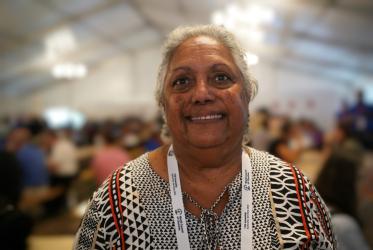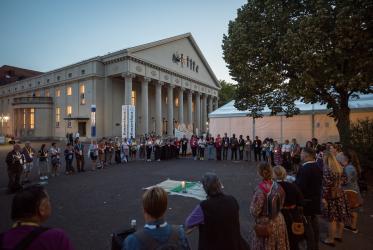Doing Theology with Indigenous Peoples’ Sources and Resources: A Synthesis
Our first order of business in doing indigenous peoples’ theologies is to deconstruct the dominant theological constructs and imaginaries of Western Euro-centric Christianity. This is the consensus among us who do theologies with and for our peoples and our struggles.
To deconstruct Euro-western discourses and imaginaries is imperative among indigenous peoples in view of our continuing spiritual colonization by Euro-centric Christianity and its modes of spirituality; the continuing imperialism of Euro-western theologies - where these theologies continue to force their truth into our worlds and consciousness,[1] and the continuing subjugation and marginalization of our cultures, religious traditions, and indigenous wisdom.
It need be noted however that that there remains a rich diversity and variety in our historical experiences, cultures and even aspirations; and that our experiences of colonization and Christianization are diverse - that these also have brought positive and constructive changes in the lives of a significant number of indigenous communities, and generally, in the process of nation-building.
Notwithstanding, our perspectives, theological constructs, and indigenous spiritualities need to rise alongside and not simply as subtexts or superstructures of Western Christianity‘s thought and faith praxis.
Indigenous theologies are and need be radically political for reasons that the subjugation of our peoples is real in all facets of our lives and living. On top of our spiritual and theological colonization, we continue to witness the continuing oppression, exploitation, marginalization and suffering of a vast number of our peoples and nations. Our ancestral lands and sacred grounds are being desecrated and violated without let up. Our peoples are being displaced, uprooted, even annihilated in genocidal scale. Our indigenous way of life and practices are being used and misused, abused, exploited [and in many cases commercialized by new age entrepreneurs and the highly lucrative tourism industries and their like]. A vast number of our peoples are poor, landless, homeless and hungry. Our response and resistance to these continuing aggression is tragically resulting to the wholesale violation of our rights. Our leaders are being abducted, tortured and killed. Our communities are being harassed and persecuted. To do indigenous peoples’ theologies ‘necessarily include analyses of this ongoing and historic oppression of our peoples (G. Tinker)’, and mobilizing our people to resist in a struggle for life. Indigenous theologians are and need be committed to their peoples’ ongoing struggles for the full/dignified/good life.
Doing indigenous theologies in and through our struggle for life include our struggles to reclaim our own indigenous and marginalized identities. Basic to our theological and political struggles to reclaim our identities are our struggles for self-identity, self-determination and the re-possession of our lands and sacred grounds. We also do theologies by performing our rituals and ceremonies, by singing the songs and the hymns and chants of our ancestors, beating our drums and gongs, playing our music, our didgeridoos and flutes, celebrating and speaking our own native tongues/languages, telling our stories and sharing our visions, carving and painting our totems, icons and images; we also do theology with our indigenous feminist imaginations and constructs of divinity, with our women priests, healers and diviners, with our struggles to empowering our women.
In the act of reclaiming via the above we bring to the surface resources from our cultures and religious traditions as well as our ongoing [experiences] of struggle. We do theology with these resources for these are our gifts and our identities. Doing theology is thus a struggle against the attempts of our colonizers and the dominant societies to wipe out our identities and the grounds of who we are: our lands, our languages, our cultures and religious traditions, and visions.
Our indigenous theologies need to focus not on building churches but on rebuilding our national (indigenous) communities.
We have visions of the full and abundant life indigenous to our peoples and communities (ex. Suma Qamana, Sobaliba, Sumaq Kawsay, Endanazaca), cosmo-visions that celebrate community and communion with the earth and the whole of creation. We seek balance and harmony with the earth who owns us. We strive to affirm and uphold the sanctity and dignity of life in its totality. To build and rebuild communities is at the end of our theological work as our concept of the church is not bound to institutional, denominational and provincial definitions. Our ecclesial vision is an earth community renewed, where power is being exercised to promote inter-human and ecological justice.
In pursuit of our community-building work, we do theologies that
promote our indigenous visions of the full/good/abundant life
seek for the transformation of our churches and societies
seek for new evangelization and mission paradigms
challenge social orders and political systems that exclude and marginalize indigenous peoples and other marginalized groups, and pursue economic, social, and ecological justice.
raise the ecological question [from our indigenous (ecosophy/ecospirituality) perspectives] - in the affirmation of our inter-relationship with the earth and the cosmic universe
raise the woman question - as we need to also have the confidence for self-criticism and engagement in critical analysis of our contexts
work for the inter-culturation of the Gospel marked by mutual respect and reciprocity
advance the struggles of indigenous peoples for self-determination/autonomy
stand in solidarity with other marginalized groups in their quest for the full life.
theologies that are ever conscious of the concerns, experiences and role of women and the category of the ’other’ or minority issues within the indigenous communities.
Indigenous theologies may proceed from the Judaeo-Christian scriptures but our primary texts remain that of our realities: the states of our lands, peoples, and communities; our cultural and religious traditions, and our shared vision and struggling together. We seek for a direct correspondence between our ‘texts’, our voices, especially the repressed voices amongst us, and that of the charter story of the Christian faith. We seek to develop a new language to speak about God and the mystery of life by starting from where the indigenous peoples of the world are, today.
As we go into doing and constructing theologies with and for our peoples we proceed from our main sources and resources: God’s cosmos and creation or the earth and all that dwell therein, our visions and dreams, our daily lives and struggles, our stories and rituals, the voices of women amongst us, our cultures and religious traditions, and the life-giving/sustaining texts from our Christian tradition.
Note: A select group of indigenous theologians met in Geneva in October 2009 to talk about the Sources and Resources of the Indigenous Theologies. This systematic Report expresses the findings of the group of theologians. The consultation was enriched by the experience of living, symbols, rituals, narratives of the wisdoms and spiritualities of the represented indigenous peoples. The articles that were present at that time are going to appear in the Ecumenical Review by November 2010.
[1] Where doctrinal constructs and imaginaries such as sola scriptura, fall and redemption, and others serve as devices to maintain control of converts from indigenous communities.




